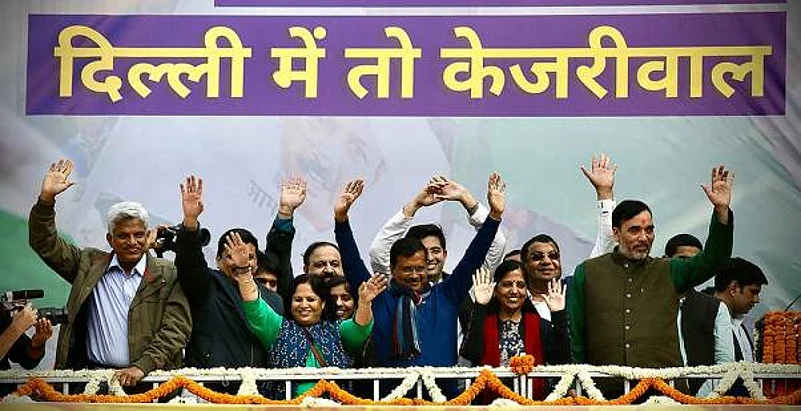The chorus went up instantly. “It’s the defeat of communal politics,” everyone said in one voice.
As the Aam Aadmi Party (AAP) swept the Delhi assembly elections, this was taken as a self-evident fact. Talk in TV studios and on social media—whether grudging or exulting—spoke the same unambiguous words. As I get down to write this, there are already several articles analysing the BJP’s defeat in terms of the high-pitched campaign they ran—filled with talk of bullets. Even Republic TV said it’s “a lesson” for the saffron party.
Now, there is no denying that Delhi witnessed a bitter and polarised campaign in the run-up to the assembly polls. But to say this is the end of “Hindu nationalism” narrative would be to play ostrich—or rather, to run a whole ostrich farm on a beach.
Advertisement
Make no mistake. AAP’s hat-trick is no mean feat. But it won’t be wrong to say that in its triumph, there also lurked a defeat of sorts. Because the saffron party was successful, to a very great extent, in shifting the focus from governance to “Hindu nationalism”. It is as if, mentally, the ground itself had shifted—and AAP too had to move with it.
Rewind to the more micro-level scenes as the Delhi campaign unfolded. Whenever and wherever Outlook asked people who they would vote for, most of them plumbed for what would seem a curious answer at first glance: ‘Modi for PM, Kejriwal for CM’.
Advertisement
Most of them opined that the Narendra Modi regime’s decision to bring the Citizenship Amendment Act (CAA) was, in fact, right—on being asked, they would first parrot the official line that ‘Muslims have nothing to fear about’.
Probed further, the deeper thoughts would not take long to be expressed. On February 8, voting day, many people I spoke to discredited the Shaheen Bagh protests and expressed their fear about “all of Delhi turning into Shaheen Bagh”. There were those who said they would vote for the BJP to “keep Muslims out”.
So why did Delhi still vote for the AAP? First, we must understand that Indians realise the difference between state elections and Lok Sabha elections—like we saw in Jharkhand and before that in Rajasthan, Madhya Pradesh and Chhattisgarh in 2018. Just scan their Lok Sabha voting patterns for the contrast.
Secondly, thinking ‘locally’ means people will go for a credible face who promises to deliver. Delhi BJP simply did not have such a leader. Remember how Rahul Gandhi was widely seen as being ‘no match’ for Modi in the general elections? Similarly, the gap between Kejriwal and BJP’s Manoj Tiwari was too stark for anyone but the most naïve voter not to notice.
And yet, if people want bijli, paani, and schools in their state, they could still want CAA and NRC in their country. A vote for Kejriwal does not mean a vote against Modi and Amit Shah or the BJP’s “Hindutva” agenda. It simply means the Indian voter is smart enough to want both the ‘freebies’ and the fable of Hindutva nationalism. Both governance and God!
Advertisement
“Delhi has given the message that they will vote for those who will provide schools, cheap electricity and hospitals. This is a new kind of politics. It is a new and good sign for the nation,” Kejriwal said in his victory speech.
Indeed, it is a “new kind of politics”. A politics where religion takes centrestage. One where ‘Ram’ and ‘Hanuman’ are the parameters that define a leader’s suitability to run a state government—or define the governance agenda for the country. Where it’s important for every person to wear religion on his sleeve.
Ask yourself. Would you have voted for the AAP had Kejriwal met women protesters at Shaheen Bagh? Would they have come back with a landslide victory had the CM expressed his views on the ‘anti-nationals’ studying in Jamia or the ‘Urban Naxals’ at JNU? How much difference would it have made had he not chanted the Hanuman Chalisa?
Advertisement
What Delhi politics has shown is a strange duality. A new world where ‘kaam ki rajneeti’ needs to be suffused with ‘bhagwaan ki rajneeti’.




















